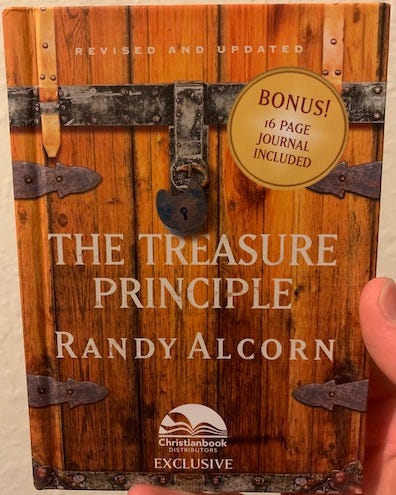The Treasure Principle by Randy Alcorn

This book was given to me because of Lifework Leadership that I am part of. Our coach Scott Auker actually said that this book impacted him greatly after it first came out in the early 2000s. I knew that we were going to review and discuss it in early December when the group got together so I made sure that it was one I spent time learning from. All that the author, Randy Alcorn, had to share was wonderful. The Biblical principles and references were of course my favorite part of the book. I had previously read some great books on God and finances but this one is definitely up there in the top 5 on that subject now.
Early on in the book, I just noted the way that the author explained this passage. What jumped out to me was the fool part. This is what society deems normal, isn’t it? Save for retirement and easy living? Work hard for 40 years then never work again and relax? What is that? That’s not living! That’s waiting to die!!
Pg. 5, In stark contrast, Jesus spoke of a rich man who spent all his wealth on himself. He planned to store up for early retirement and easy living. But God called the man a fool (Luke 12:20).
30,000,000 years, can you imagine? What if you had to wait that long for an investment to pay off? I would have no problem waiting. I’m not working for the fruits of my labor, I’m working because God created us to work and manage the earth and all things within it. Genesis says, “Then God said, ‘Let us make mankind in our image, in our likeness, so that they may rule over the fish in the sea and the birds in the sky, over the livestock and all the wild animals, and over all the creatures that move along the ground.’” — Genesis 1:26 NIV.
Pg. 12, Financial planners tell us, “When it comes to your money, think thirty years ahead, not three months or three years.” Christ, the ultimate investment counselor, takes it further. He says, “Don’t ask how your investment will be paying off in just thirty years. Ask how it will be paying off in thirty million years.”

What a great story. I am building a larger and larger collection of books. There’s highlighter and notes throughout all of them and often times I find myself feeling the same way that Randy did, I have difficulty letting them out of my grasp. But I can only imagine the joy that he felt more and more often as he saw that more and more people were positively impacted by the books he used to clutch so closely.
Pg. 24, Back then the material possessions I valued most were my thousands of books. I loaned them out, but it troubled me when they weren’t returned or came back looking shabby.
Then I sensed God’s leading to hand over all the books to begin a church library. I later looked at the names of those who checked them out, sometimes dozens of names per book. I smiled, realizing that by releasing the books, I had invested in others’ lives. Suddenly, the more worn the book, the happier it made me. My perspective totally changed.
I love that. “Give long enough and you’ll become more like Christ.” I’ve seen this more and more throughout my own life. I feel most loving and most joyous and most Christlike when I prioritize my giving. But the thing is, it’s not giving out of surplus that is most rewarding, it’s sacrificial giving and that’s something that I know many people who have made giving a habit and discipline can also affirm.
Pg. 32, God uses giving to conform us to His image. Gaze upon Christ long enough and you’ll become more of a giver. Give long enough and you’ll become more like Christ.
The same Greek word is used for Christian giving and for God’s grace.

This is a great visualization and something that is a decent analogy to what we experience on earth. We cannot take ANYTHING with us, only us. But, we can send things ahead of us. We can send people to heaven. We can leave prayers as our legacy and they can outlive us by generations. I challenge you to read this following passage and pause. Put yourself in the position of a tourist in France, smell the wine, see the Eiffel Tower, visualize the people. Then strive to understand how you would you really feel. Do you understand what it means to store up for yourself “treasure in heaven” as Jesus said? I hope so.
Pg. 49, Suppose your home is in America, but you’re visiting France for three months, living in a hotel. You’re told you can’t bring anything back on your flight home. But you can earn money in France and send deposits home.
Would you fill your hotel room with expensive furniture and art? Of course not. You would spend only what you needed on the temporary residence, sending your treasures ahead so they’d be waiting for you when you got home.
People are people, we are sinful by nature because our ancestor’s ancestor’s ancestor’s ancestors sinned. Adam and Eve sinned and thereby all of the world was sinful and is sinful. Things get abused and people make mistakes; well-intentioned things can always maintain their positive benefits. Tithing and giving in general has been abused by people in power at times but that’s why due diligence is important when finding a church to contribute to and I believe it’s also important to trust in God and His guidance.
Pg. 67, When I’ve heard such a large number of people testify to how tithing put them on the road to life-altering generosity, it’s hard for me to understand the extreme animosity some have toward this practice (entire websites are devoted to opposing tithing). Yes, it has sometimes been abused, but let’s not throw out the baby of tithing with the bathwater of legalism.
That’s a lot of interest. $1 in God’s hand is much more valuable than $100 in ours. Everything in this world is God’s — not ours.
Pg. 71, Jesus said, “Everyone who has left houses or brothers or sisters or father or mother or children or fields for my sake will receive a hundred times as much and will inherit eternal life” (Matthew 19:29). One hundred times as much means 10,000 percent interest. That’s why I don’t believe it’s ever wrong to give now instead of later. God can produce far greater returns on money invested in Heaven today than Wall Street or real estate ever can.
We are also the middlemen. The things of this earth are not ours, we are not of this earth.
Pg. 79, Suppose you have something important you want to get to someone who needs it. You wrap it up and hand it over to the FedEx guy. What would you think if instead of delivering the package, he took it home, opened it, and kept it? You’d say, “The package doesn’t belong to him! He’s the middleman. His job is to get it from me to the person it’s intended for.”
“Just because God puts His money in our hands doesn’t mean He intends for it to stay there.” — Randy Alcorn

One brief opportunity: some call it a dash, some call it a blink, I call it an opportunity.
Pg. 84, We have one brief opportunity — our lifetime on Earth — to use our resources to make a difference. John Wesley said, “I judge all things only by the price they shall gain in eternity.”
Missionary C.T. Studd wrote, “Only one life, ‘twill soon be past; only what’s done for Christ will last.”
Amen.
Pg. 99, I invite you to send your treasures on to Heaven, where they will safely await you. When you do, you’ll embrace the freedom, experience the joy, and sense the smile of God. When you give, you’ll feel His pleasure.
I think that this is one of the most important parts of the entire book. Each of us are going to experience different things in this life because each of us were created differently. We are all unique. We are all one of a kind.
Pg. 102, When it comes to financial stewardship, how God leads you will be different in many details than how He leads me. He hasn’t handed each of us a standardized checklist with boxes to mark off. Rather, He has provided us His Word with stewardship principles we must wrestle with. In the process of this struggle, God expects us to seek His face and to pursue counsel from godly believers.
I greatly enjoyed hearing about all the different types of questions that people had. I can totally see how this would be a contradiction at first glance but really, if you understand that we only have life because God gave it to us to have, only have a house because God gave it to us to use, only have a job or money or a family or a car or anything because God gave it to us…
“Do you understand that it’s impossible to please God in any way other than wholehearted surrender?” — Francis Chan
Pg. 127, (In the questions and answers section of the book): You wrote that Malachi 3 speaks of robbing God “by withholding tithes and offerings.” How could people be robbing God by withholding a freewill offering? That seems like a contradiction.
… I think this passage, by including not just tithes but offerings, demonstrates God has a will for our lives that goes beyond the minimal directives of Scriptures. Read it for yourself (Malachi 3 linked here) and see whether you agree.
Amen. I love the part where the author shares that he wishes his readers could have heard the excitement from this gentleman. I love the closing here also, “may the same be true of us all.”
Pg. 134, (In the questions and answers section of the book): What stories have people told you about experiencing the joy of giving through practicing the Treasure Principle?
… A successful businessman told me that after reading The Treasure Principle he now knows why God blessed him financially. It’s not so he can drive nicer cars and live in a bigger house. It’s to build God’s kingdom.
I told him about several missions groups and pro-life projects and ways to help persecuted Christians. I wish you could have heard his excitement as he determined to liquidate more earthly assets and dramatically expand his eternal investment portfolio! Guilt had nothing to do with it. It was all about privilege and sheer happiness.
This man followed through, and over the years he’s given more and more. His happiness is real, and it’s glorious! May the same be true of us all.

This book was wonderful and enlightening and expanded my horizons. The Biblical basis for the entire book was what encouraged me and guided me and allowed me to enjoy it so greatly. I loved learning from this book and there were some great things that I can definitely apply to my life. I also will be sure to improve my mindset and perspective by using the advice of the ultimate investment counselor, Jesus. I will seek to see how my investment will be paying off in 30 million years, not just 30; and I’ll do the same with my life also.
I gave this book a 4/5